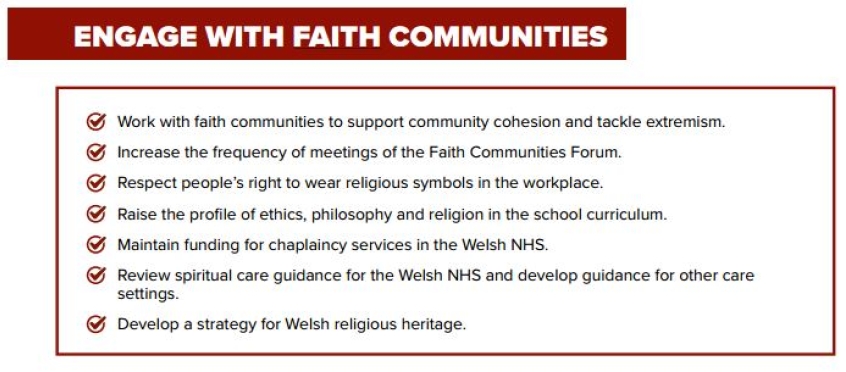A week today voters in Wales, Scotland and Northern Ireland will go to the polls to decide their regional governments.
Scotland is considered a done deal with the only question being whether the Tories will beat Labour to second place behind the SNP. Wales is more interesting debate with Plaid Cymru and the Conservatives both pushing hard after 17 years of Labour rule.
Health and tax have dominated the debate so far but little has been mentioned of faith engagement or attitude to religion.
Christian Today has taken a look at the manifestos of four biggest parties standing for the Welsh National Assembly. Here is what the parties say about their attitude to faith groups.
Labour
A Labour spokesman told Christian Today their manifesto "confirms we will 'maintain the valuable work of the Communities Faith Forum' which is chaired by the First Minister".
The Faith Communities Forum is an initiative begun under the Labour assembly to give direct access between faith leaders and the first minister. The forum includes two representatives from Baha'I; Buddhist; Hindu; Jewish; Muslim and Sikh faiths. Christian representatives on the forum are from the Evangelical Alliance Wales, Church in Wales, Roman Catholic Church in Wales, the Free Church Council and Churches Together in Wales (CYTUN).
A Welsh Labour spokesman told Christian Today the fact the forum is chaired by the first minister "shows how seriously Welsh Labour takes its responsibility to involving all communities in Wales in decision making".
Conservative
The Conservative manifesto includes a seven-point plan to "engage with faith communities".

Darren Millar, Welsh Conservative Clwyd West candidate, told Christian Today faith communities make an "enormous contribution to Welsh life".
He added: "The next Welsh Government must utilise the levers at its disposal to build upon this and offer support.
"For these reasons, Welsh Conservatives felt it was important to include a dedicated section in our manifesto outlining how we will engage with faith communities."
Dan Boucher, the Conservative candidate for South West Wales, told Christian Today the inclusion of seven explicit commitments "demonstrates the Party takes the place of faith communities in Wales very seriously".
He added the Conservative manifesto "stands in stark contrast to that of the other main parties" which he accused of making a "passing reference to religion".
Plaid Cymru
Plaid Cymru translates as the Party of Wales and was thrust to prominence outside Wales when leader Leanne Wood took part in national television debates for the 2015 general election.
Plaid's manifesto makes few references to religion. It promises to increase support to tackle extremism but makes no mention of churches or working with faith groups.
Their manifesto also declares full citizenship for "everyone who lives in Wales, whatever their language, the colour of their skin, their religion, their roots, their gender or sexual orientation".
Christian Today contacted Plaid Cymru for comment.
UKIP
UKIP have enjoyed a surge in the polls and are predicted to come close behind the Conservatives and Plaid Cymru.
Their manifesto makes a strong reference to religious tolerance and says it is "committed to protecting religious freedoms for all believers in the UK". The manifesto goes on to "challenge the 'culture of offence' as it risks cutting down free speech. We will not condone faith position which is itself intolerant and refuses to recognise the human rights of others."
Liberal Democrats
The setback suffered by the Lib Dems at the 2015 general election has hit the Welsh party too and polls predict they will come fifth behind UKIP.
Their manifesto mentions plans to boost faith tourism and plans to attract more visitors to places of worship.
In relation to inclusion, the Lib Dems to give everyone equal opportunity "regardlss of gender, ethnicity, religion, sexuality, or disability".
Otherwise there is no mention of faith, religion or church engagement in the Lib Dem manifesto.
The Liberal Democrats were contacted for comment.













